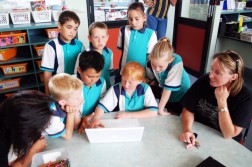Anyone in despair over the quality of political debate in Australia should read George Lakoff’s Don’t Think of an Elephant, which talks about the way ideas are framed in politics. ‘Framing’ is about developing and advocating a particular worldview, which includes a consistent and linked set of ideas and a language which carries and evokes them. The worldview has to be simple and easily identified.
The Howard Government has done this very successfully, especially in education. Its agenda has been set largely by advocates for a publicly-funded choice of schools who have effectively appropriated words such as choice, competition, private, excellence, exclusive and values for their own purposes. Labor’s response has typically echoed this worldview, and Kevin Rudd’s announcement on school funding policy last week was no exception.
Like his predecessor, Kim Beazley, Rudd has disassociated himself from the so-called ‘hit list’ of private schools that would have lost funding under Mark Latham. In its place, he is advocating a policy of ‘need and fairness’ supporting parental choice by raising standards in all schools and, in the process, somehow avoiding the creation of a two-tier system. He foreshadows an increase in spending, saying that no school would have its funding cut under Labor. He mimics the same language of choice and ‘parental sacrifice’ commandeered by the Federal Government.
Language aside, the ALP announcement is light on detail but this is no surprise, because the policy won’t work. It is simply not possible to have subsidised choice and ‘need and fairness’ in the same policy.
Almost without exception, ‘choice of schools’ is an option only for those who can afford it. Even under so-called voucher systems, exercising choice means paying some level of school fees. Along with other devices, fees act as a sorting mechanism so that choice of schools effectively becomes choice of students by schools. Choice may increase opportunities for some, but it’s at the expense of comparable opportunities for others. It certainly increases the resource gaps between schools. It doesn’t matter how much you invest in education, until this fundamental equity issue is resolved, ‘need and fairness’ will always take a back seat.
Rudd’s policy will effectively sustain the stratified education system we have at present, with all its negative implications for equity, opportunity and (eventually) economic growth. It will be interesting to see how he deals with these issues closer to the election, if at all.
Last week’s announcement follows hot on the heels of Labor’s foray into the national curriculum, New Directions for Our Schools: Establishing a National Curriculum to Improve Our Children’s Educational Outcomes.
Again, the difference between the Labor and Coalition policies is hard to pick both rely heavily on crisis-creation, hyperbole and even fraud. There are reasons a national curriculum might be useful, but the ALP policy document looks like something that was cobbled together in a hurry by an Opposition desperate to beat the Government at its own game.

Thanks to Fiona Katauskas
The document gives misleading information about the number of people who move interstate each year and who therefore need a national curriculum yet this figure as a proportion of Australia’s population has barely changed. It cites Singapore as a country which has gained success by pursuing a national approach but with a population of less than five million (smaller than two Australian States), it is hard to imagine Singapore taking any other approach.
Far worse (and just like successive Federal Ministers), the ALP supports the need for such standardisation by pointing to alleged serious underperformance by our students. To prove their case they deliberately fudge the figures on student performance by focusing on the worst results from the Trends in International Mathematics and Science Study.
These tests examine fourth and eighth graders in maths and science. The ALP claims that students in 13 countries outperformed Australia in 2002 compared with just six in 1994/95, but they fail to mention that many more countries took part in the tests in 2002.
Throughout the document, the ALP either ignores or misrepresents our better maths and especially science results, claiming that Australia is falling behind its international competitors. Some of our international competitors are ahead of us, but most countries are well behind.
The ALP does itself little credit by fudging the figures, understating the performance of our students and, as a consequence, overstating the apparent need for a national curriculum. It should leave the crisis-creation to the Coalition. We fully expect Julie Bishop to sustain such myths about education and student performance; from Kevin Rudd and Stephen Smith we expect better.
If Rudd and Smith want to trade on crisis, they should focus on the real message emerging from international testing that the gaps between our advantaged and disadvantaged kids and communities are unacceptably high, and are made worse by existing policies and funding practices in our unsustainable landscape of public and private schooling. Labor’s new funding policy and its commitment to a national curriculum won’t make one iota of difference on this issue.
In education policy, Labor has made little effort to differentiate itself from disastrous and regressive Government policy. If it is to do so, it must develop new frameworks, ideas and language, and use these to shift the public debate, create new agendas and change policy.
Despite his initial rhetoric about social justice (silly me I thought he meant it!) and the ‘fork in the road’, Rudd’s education policies to date ignore the road sign at the fork. All he has done is wander down the path already neatly paved by the Coalition.
Donate To New Matilda
New Matilda is a small, independent media outlet. We survive through reader contributions, and never losing a lawsuit. If you got something from this article, giving something back helps us to continue speaking truth to power. Every little bit counts.



